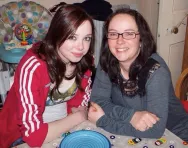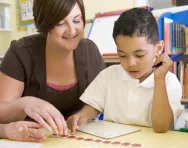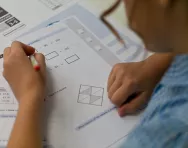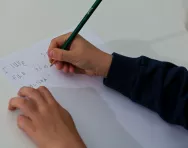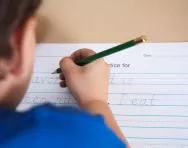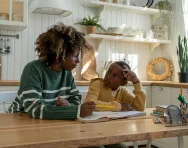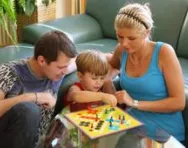"He had problems counting up in twos, fives and even tens"
Lillian Blundell, from Bath, describes her experience of the SEN and school system with her son Robbie, 16, who has dyscalculia, and shares her tips for other parents.
Coping strategies to help autistic children
Schools can be complicated places for children, teachers and parents. Autism practitioner Gina Davies explains that there will invariably be challenges when autistic children start and attend school, but strategies that enable parents and teachers to work in partnership can be very successful.
"She has had to work two or three times harder than her peers"
Helen Barylo from Coventry describes her experience of the SEN and school system with her son Aurora, 16, who is dyslexic, and shares her tips for other parents.
"She would never rest or stop talking"
Teresa Catto-Smith from Perth, Scotland, describes her experience of the SEN and school system with her daughter Leanne, 19, who has ADHD (Attention Deficit Hyperactivity Disorder), and shares her tips for other parents.
"We'll work together to develop his organising and planning skills"
Susie McCrae from Edinburgh describes her experience of the SEN and school system with her son David, 9, who has Developmental Coordination Disorder / dyspraxia, and shares her tips for other parents.
'The school worked with him to strengthen his motor and social skills'
Jane Burbridge from Folkestone describes her experience of the SEN and school system with her son Andrew, 7, who has Autism Spectrum Disorder (ASD), and shares her tips for other parents.
The parents’ guide to developmental language disorder
A significant percentage of children are thought to be affected by DLD, but it often goes unrecognised. We look at how to spot the signs and help your child.
School exclusions: everything primary-school parents need to know
Parents faced with their child being excluded from school are often very upset and confused. Moira Holden looks at the regulations that surround the exclusion process.
How to work with your child’s SENCO
Having a healthy working relationship with your child’s SENCO can help ensure they get the support they need. Here’s how to ensure you make a good team. By Lucy Dimbylow
How a SENCO could help your child
If your child has a special educational need, the school’s SENCO is likely to play a big part in his day-to-day life and learning. Lucy Dimbylow highlights nine ways in which she can help make your child’s school journey easier.
7 common school life problems solved
Every parent wants their child to be happy at school, but what if there’s a problem? Here’s our step-by-step guide to tackling and resolving some of the common issues that might crop up in primary school.
Does my child have dyscalculia?
What are the signs to look out for if you think your child might have dyscalculia or 'number blindness', and what can be done to help?
7 strategies to help defeat children’s fear of maths
What does it mean if your child has a fear of maths, and what can you do to help them get over it? TheSchoolRun offers a step-by-step plan to help you boost your child's confidence – and your own.
Dyspraxia: parents' questions answered
Dyspraxia, or Developmental Co-ordination Disorder (DCD), causes problems with language, perception and thought – most specifically issues with co-ordination. Around one in seven children has this learning difficulty and if your child is affected it can be hard to know how to help for the best. Here we answer some of the most common questions parents ask.
7 common dyslexia questions answered
If your child is dyslexic you'll want to help them get the support they need at school and at home. Dr John Rack, Head of Research, Development and Policy at Dyslexia Action, answers common questions about dyslexia identification, homework and tutoring and suggests sources of further information and advice to help you help your child.
5 ways to teach relaxation skills to your child
Knowing how to keep calm in emotionally difficult situations is an important life skill that’s never too early to learn. Even if you don’t feel you’ve mastered it yourself, you can still help your child manage their stress levels – and perhaps improve your own stress management in the process. Educational psychologist Lisa Gupta lends her top tips for parents.
Education, health and care plans (EHCP): expert tips to help parents
SEND experts Antonia Chitty and Tania Tirraoro explain how EHCPs work and share their tips on the application process.
10 questions parents of ADHD children should ask their schools
Whether you’ve just found out your child has ADHD, or are checking new schools for your ADHD child, use our list of key questions to get all the information you need.
All about dysgraphia
Could your child’s difficulty with writing be dysgraphia? Find out what the signs are, and what to do about it.
Writing practice: how to help your struggling child
Is your child’s handwriting a cause for concern? Help them to improve it with these simple activities.
Homework tips for children with dyslexia
The British Dyslexia Association shares tips to help make doing homework a calm and productive process for your dyslexic child.
Settling a child with SEN back into school
After the school holidays any child can find it unsettling heading back to school but it can be especially worrying for children with SEN. Here’s what you can do to help.
How dyslexia is identified
You think your child may be dyslexic, but how can you really be sure when they’re still quite young? Teacher and parent coach Glynis Kozma gives a few pointers for early identification.
Boosting your child's concentration skills
Your guide to the special needs that can cause concentration difficulties and tips to help your child focus.
Does your child have special educational needs?
Find out about the wide spectrum of special educational needs children can have – and how you can support them at home and get the support they need in school.
How educational psychologists can support SEN children
What is an educational psychologist and how might they help your child? We chat to consultant child educational psychologist Laverne Antrobus to find out.
Help develop your child's communication skills
Communication difficulties in children can be tackled through a variety of different activities and games. Find some ideas here to get you started.
How can a clinical psychologist help your child with SEN?
Clinical psychologist Elizabeth Kilbey chats to TheSchoolRun about what her job involves and how a clinical psychologist can support a child with special educational needs.
Dyscalculia explained
How can you tell if your child has dyscalculia? TheSchoolRun takes a look at this mathematical difficulty and suggests ways to support your child with their learning.
Explaining special needs to children
Amy Schofield speaks to SEN expert Vicki Dawson to find out how to approach the subject with your child.
Childhood dyspraxia explained
Your guide to what dyspraxia is and how you can support a dyspraxic child at home.
How to strengthen your child's coordination skills
Handwriting, buttoning, drawing or using a knife and fork… your child’s hands can perform the most amazing array of tasks. We take a look at how you can support the development of your child's movement skills.
Dyslexia: strengths, advantages and opportunities
While dyslexic children can have learning difficulties they can also be very gifted in certain areas. Find out how to create a positive and constructive learning experience for your dyslexic child with our top advice.
Getting the right support for children with dyslexia
Your guide to the signs of dyslexia and step-by-step advice on how to get your child the appropriate educational support.
8 dyslexia signs you should never ignore
Concerned about your child's progress at school? Familiarise yourself with the signs of dyslexia so you can get help for your child if they need it.
Living with autism
How can you help a child with autism? We look at the different kinds of treatments available.
10 things you need to know about Autistic Spectrum Disorders in children
Autistic Spectrum Disorders (ASDs) are often difficult to understand and diagnose. We take a look some of the key things to know about them and how they could affect your child.
Engaging activities for children with autism
Providing your autistic child with activities that stimulate them but make them feel secure at the same time can be a challenge. Tessa Scott looks at fun activities that benefit autistic children.
Asperger’s Syndrome diagnosis - what happens next?
A diagnosis of Asperger's Syndrome may seem a relief after months of uncertainty. But what happens next? Catherine Burrows reports.
Living with ADHD
What is ADHD and how can it affect your child? We take a look at the symptoms and provide expert advice on the needs of a child with ADHD.



